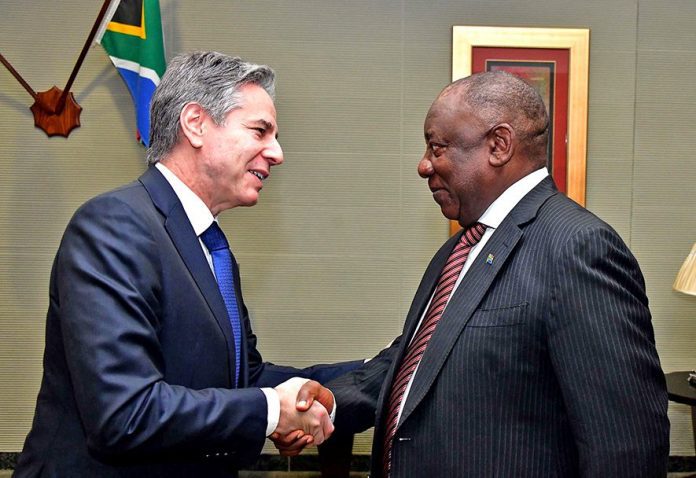As expected, President Cyril Ramaphosa took the opportunity at Sona to address the elephant in the room, the shifting platonic plates in geopolitics, and sought to assert where exactly South Africa stands.
But in a strategic and carefully thought out manner, he also moved to remind South Africa of all historic moments where her people united, black and white.
The unity talk was necessary for both domestic affairs as well as the ongoing diplomatic fallout between the RSA and USA.
Ramaphosa must be commended for placing these burning issues at the top of his Sona speech.
On unity, it was evident that the divisions that have ensued owing to the signing of the NHI, Bela and Expropriation Bill into law have troubled Ramaphosa.
These are political moves he has made that have divided the country across racial lines.
Ramaphosa, a historically uniting figure among black and white, has caused unintended racial divisions for rubber stamping the three crucial laws for redress and bringing about equality.
It was impressive to note that he was not apologetic about these laws that have not been taken well by the white community.
Instead, he sought to make them understand why things had to be this way and why the unusual was difficult to accept, especially for those that have lived the life of unfettered privilege for centuries.
Ramaphosa was firm, and his manners of invoking the Freedom Charter, in its 70th anniversary, to drive his point home were a work of art.
“The Freedom Charter sets out a vision of a united, non-racial, non-sexist, democratic and prosperous South Africa.
“It sets out a vision of a country in which government is founded on the will of the people, where the land is shared among those who work it, where the people share in the country’s wealth, and all are equal before the law,” said Ramaphosa.
“It is this vision that continues to guide us as we work to build the nation we all want. It is the spirit of the Congress of the People that inspires us as we prepare for a national dialogue in which South Africans are once again called upon to chart a new path for our country.”
He didn’t end there; he also touched on how this unity brought about the end of apartheid.
Moreover, he reminded all and sundry how the Covid-19 pandemic was defeated by unity of purpose among black and white in RSA.
With that, he struck right into the hearts of the hardest of merchants of whiteness and Afrikanerdom who have been hellbent on opposing Bela, NHI and the Expropriation Act.
It was his switch from this call for unity domestically to linking it to the geopolitics of our times.
Ramaphosa was emphatic that the new path that South Africa will seek to develop in the much-awaited national dialogue must be premised on the global balance of forces.
He unequivocally rebuffed the Western economic, cultural, military and social superpower that is the USA from its unfounded attempts to corner South Africa based on falsehoods and opportunistic attempts to punish us for choosing BRICS and taking a firm stance against the extension of the USA that is Israel in its genocidal human rights violations in the Middle East.
“We are seeing intensifying competition over trade, technology and influence in global institutions. There are global fundamental shifts underway that affect every aspect of human life,” said Ramaphosa.
“From the growing impact of climate change to rapid advances in artificial intelligence, geopolitical tensions and violent conflicts. In the face of these challenges, we are witnessing the rise of nationalism and protectionism, the pursuit of narrow interests and the decline of the common cause.
“This is the world that we, as a developing economy, must now navigate. But we are not daunted. We will not be deterred. We are resilient people. We will not be bullied. We will stand together as a united nation,” he went on.
“We will speak with one voice in defence of our national interest, our sovereignty and our constitutional democracy. By staying true to our values, by harnessing our unique strengths and endowments, and by forging a common purpose, we can turn these trying circumstances to our advantage and propel our country forward.
“As South Africans, we stand for peace and justice, for equality and solidarity.
We stand for non-racialism and democracy, for tolerance and compassion. We stand for our shared humanity, not for the survival of the fittest.”
He continued talking about South Africa choosing cooperation by countries of the world and a multipolar world, a cornerstone and guiding principle for the BRICS Plus group, the newest emerging superpower bound to replace the original, Western-dominated world forums.
The rest of the speech was the ordinary mumbo jumbo about job creation and inclusive growth, investing in infrastructure development and fixing municipalities, among other things.
But by and large, there was nothing groundbreaking that South Africans hadn’t heard from previous SONAs and other public addresses by Ramaphosa.
The speech was in many ways a reflection of the man Ramaphosa has become, a fellow with “diplomatic mastery” on global affairs as Russian Federation boss Wladimir Putin once described him, to a man who has turned the tide domestically by ultimately making the bold moves on the signing of three radical laws to achieve social justice and equality.



